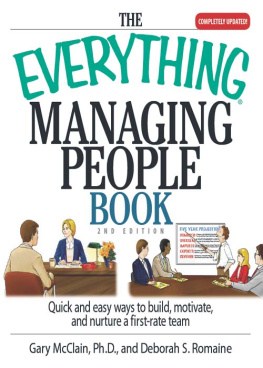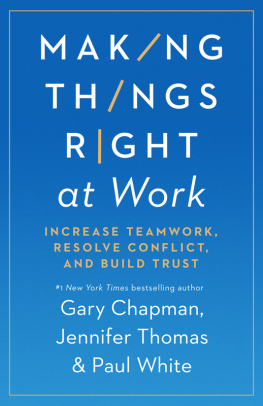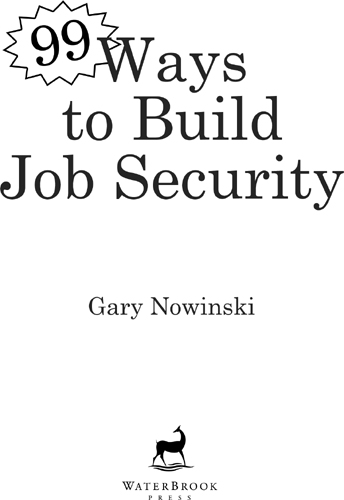Introduction
In tough economic times, maintaining your job security can be a dicey affair. Employers are constantly looking for ways to save money. Cutting staff is sometimes the first option, but often the last. No matter when it happens, it still hurts.
When employers are faced with reducing their staff, they evaluate each employee. They look at work history, attitude, accomplishments, and other factors to decide who stays and who goes. Some layoffs are determined by how long a person has been on the job, but there are times when longevity isnt the deciding factor.
More and more companies are taking quality and attitude into consideration. If they have a choice between an experienced employee with poor communication skills and less-than-desirable personal qualities and a less experienced person who is confident, trustworthy, and maintains a professional attitude, who do you think will be kept on the team? The more professional one will stay while the other hits the sidewalk.
This book contains ninety-nine practical things you can do to help build your job security. Some are fairly easy to implement while others will take a lot of soul searching and a commitment to change. Some of the suggestions are steps you can take right now, but there are other tips that will require an investment of time or money or both.
Some factors that affect job security are completely out of your hands, such as when a company goes bankrupt and closes. You cant do much about that except pray, which is always a good idea because God cares deeply about what happens in your life. But you do have control over how you use the suggestions in this book. If you will put into practice the advice in just one of these chapters, it will affect in a significant way how your superiors value your employment.
The diligent find freedom in their work;
the lazy are oppressed by work.
P ROVERBS 12:24
Whether you realize it or not, your attitude and how you behave on the job are noticed daily. Consciously or subconsciously your superiors are taking note of your attitude and watching how you interact with other employees, supervisors, and customers.
How you come across to your boss could be the difference between keeping and losing your job if pink slips are on the horizon. So its important to be aware of how your behavior in the workplace is perceived.
It doesnt matter if you work in an office for a Fortune 500 company or on the line at a factory, the suggestions contained in this chapter will help you develop and maintain the kinds of behaviors that make a great impression on your colleagues and superiors alike.
Loyalty in an employee is something that all employers seek. Years ago companies didnt have to worry so much about worker loyaltypeople would stay with the same company for years, even decades. Today however, nearly 65 percent of workers stay with an organization less than five years.
Employers crave loyalty, so you need to do all you can to demonstrate you are a truly loyal employee. You can do this with a few simple actions:
Research. Find out all you can about the business and its leadership.
Go the extra mile. Ask what you can do to help the organization.
Volunteer. If the company plans a special activity or celebration, volunteer to help in its organization or implementation or both.
Dont broadcast job searches. Even if you are looking for another job elsewhere, dont let a co-worker knowword will eventually get to the boss.
Nothing appeals more to an employer than an honest employee. Employing someone who is truthful, reliable, and trustworthy is a business asset of immeasurable value. If your superiors know they can depend on you to always be honest and truthful, then you have a distinct advantage over others when it comes to job security.
An honest employee is one who doesnt steal time by coming in a few minutes late or taking an extended lunch simply because theres no time clock to punch. A trustworthy employee is one who doesnt engage in workplace thieverytaking pens, pencils, sticky notes, tools, and other company-owned items home for personal use.
Honesty also extends to your rsum. More and more companies engage third parties to check the validity of information on your rsum. One lie on your rsum can negate other valuable experience. So play it safe. Being truthful pays many more dividends than dishonesty.
Integrity goes hand in hand with honesty and trustworthiness. In the workplace, a person of integrity is known throughout the organization as someone who is always truthful, honest, straightforward, and reliable. A reputation of integrity will set you apart from others and keep you in good standing with your superiors.
But how do you establish a reputation as a person of integrity? Here are a few suggestions:
Do what you say youre going to do.
Be ethicaldo the right thingin all your business dealings.
Be honest in your communication with colleagues and customers.
Dont pass the blame for mistakes. Accept responsibility for your actions.
Avoid hypocrisy and favoritism.
The Golden Rule is always a great place to start for building integrity in the workplacetreat others as you would like to be treated. And finally act in private as you would if the whole world were watching.
In todays economy with layoffs and downsizing decimating workplace relationships, empathy is needed more than ever before.
In short, a person with empathy is someone who can identify with and understand anothers situation, feelings, or motives. In the workplace, the ability to empathize with customers, colleagues, and superiors will increase your value as an employee.
























